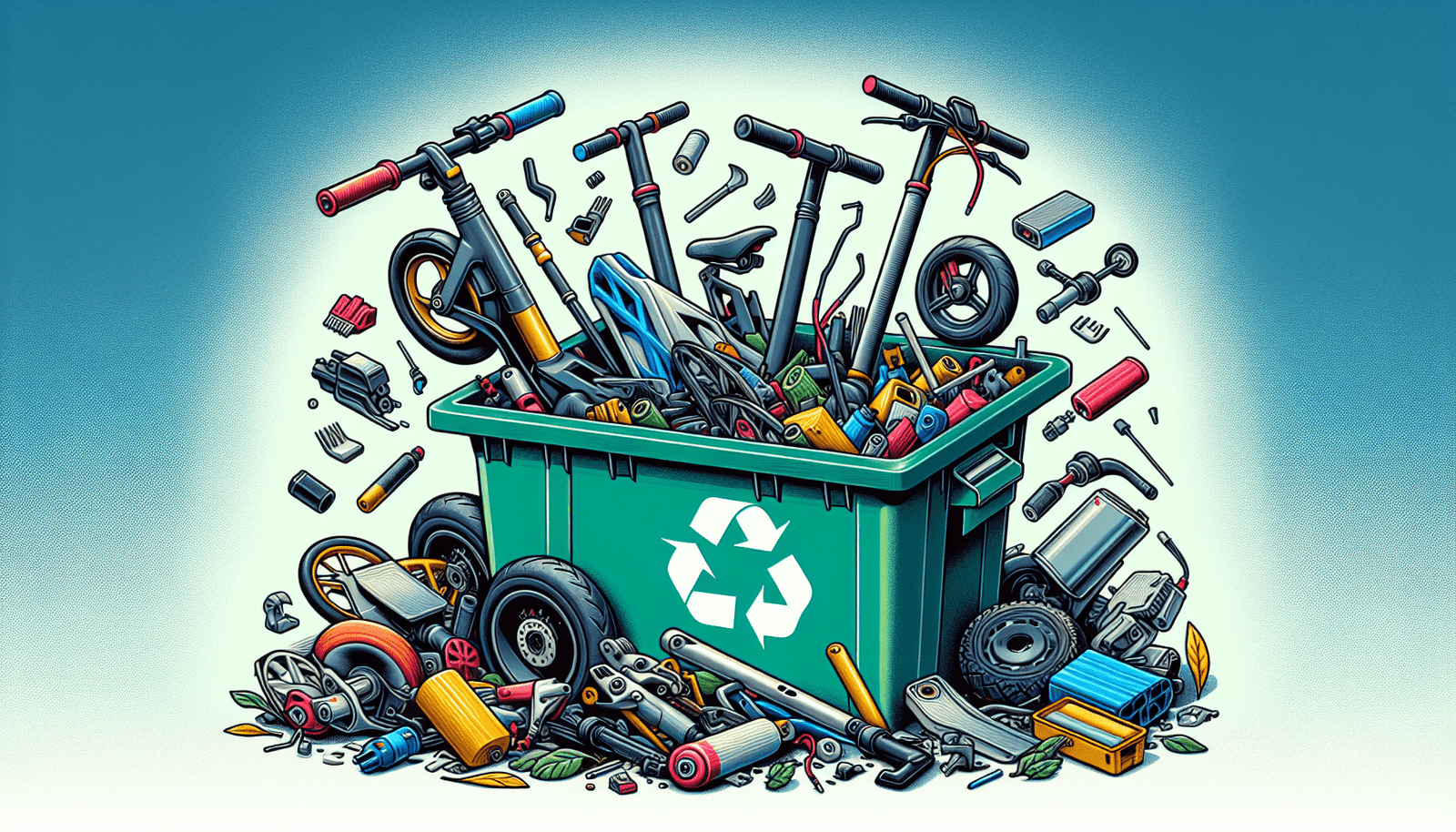When it comes to maintaining your electric scooter, one question that often arises is how to properly dispose of old or damaged parts. Ensuring the responsible disposal of these components is not only essential for the environment but also for the safety of those handling the waste. In this article, we will explore the various options available to you when it comes to the proper disposal of old or damaged parts from your electric scooter, providing you with the knowledge and confidence to make the right choice. So, let’s delve into the world of eco-friendly scooter maintenance!
Understand the Risks of Improper Disposal
Environmental Impact
Properly disposing of old or damaged parts from your electric scooter is crucial to minimize the environmental impact. When these parts are not disposed of correctly, they end up in landfills, causing pollution and contributing to the global waste problem. Components such as batteries, electronic parts, and plastic can release harmful chemicals into the soil and water, leading to contamination. By understanding the environmental risks, you can make informed decisions about the disposal of your scooter parts and help protect the planet.
Health Hazards
Improper disposal of electric scooter parts can also pose serious health hazards. Batteries contain toxic chemicals like lead and lithium that can be harmful if they leach into the environment. When these chemicals are not handled or disposed of properly, they can contaminate soil, water sources, and even the air we breathe. Exposure to these hazardous substances can lead to health issues, including respiratory problems, neurological disorders, and damage to vital organs. It is essential to dispose of electric scooter parts safely to protect both human health and the well-being of our communities.
Legal Consequences
Improper disposal of electric scooter parts may also carry legal consequences. Many jurisdictions have strict regulations regarding the disposal of hazardous waste, including batteries and electronic components. Failure to comply with these regulations could result in fines, penalties, or even legal action. By understanding and abiding by the laws related to proper disposal, you can avoid any potential legal ramifications and demonstrate your commitment to being a responsible citizen.
Identify Reusable or Recyclable Parts
Battery
One of the most crucial components to consider when disposing of an electric scooter is the battery. Batteries can be highly toxic and should never be thrown in the regular trash. Check with local recycling centers or electronic waste facilities to see if they accept batteries for recycling. In some cases, manufacturers or retailers may have take-back programs for their batteries, allowing you to return them for proper disposal.
Motor
The motor of your electric scooter may still have value even if it is no longer functioning. Consider reaching out to local scooter repair shops or enthusiasts to see if they can make use of it. They may be interested in purchasing the motor for repair purposes or repurposing it for other projects. Selling or donating reusable motors is an excellent way to give them a second life and reduce waste.
Wheels and Tires
Wheels and tires are typically made of rubber, which can be recycled. Check with local recycling centers or tire shops to see if they accept scooter wheels and tires for recycling. If they are still in good condition, you could also consider selling or donating them to scooter enthusiasts who may need replacements.
Electronic Components
Various electronic components found in electric scooters, such as circuit boards, wires, and connectors, can be recycled. Local electronic waste recycling facilities are equipped to handle these components and ensure they are properly disposed of or repurposed. Be sure to remove any personal data or sensitive information from the electronics before recycling them.
Plastic and Metal Parts
The plastic and metal parts of your electric scooter can often be recycled. Separate them from other non-recyclable materials and check with local recycling facilities if they accept these materials. By recycling plastic and metal parts, you contribute to reducing the demand for raw materials and promote the circular economy.
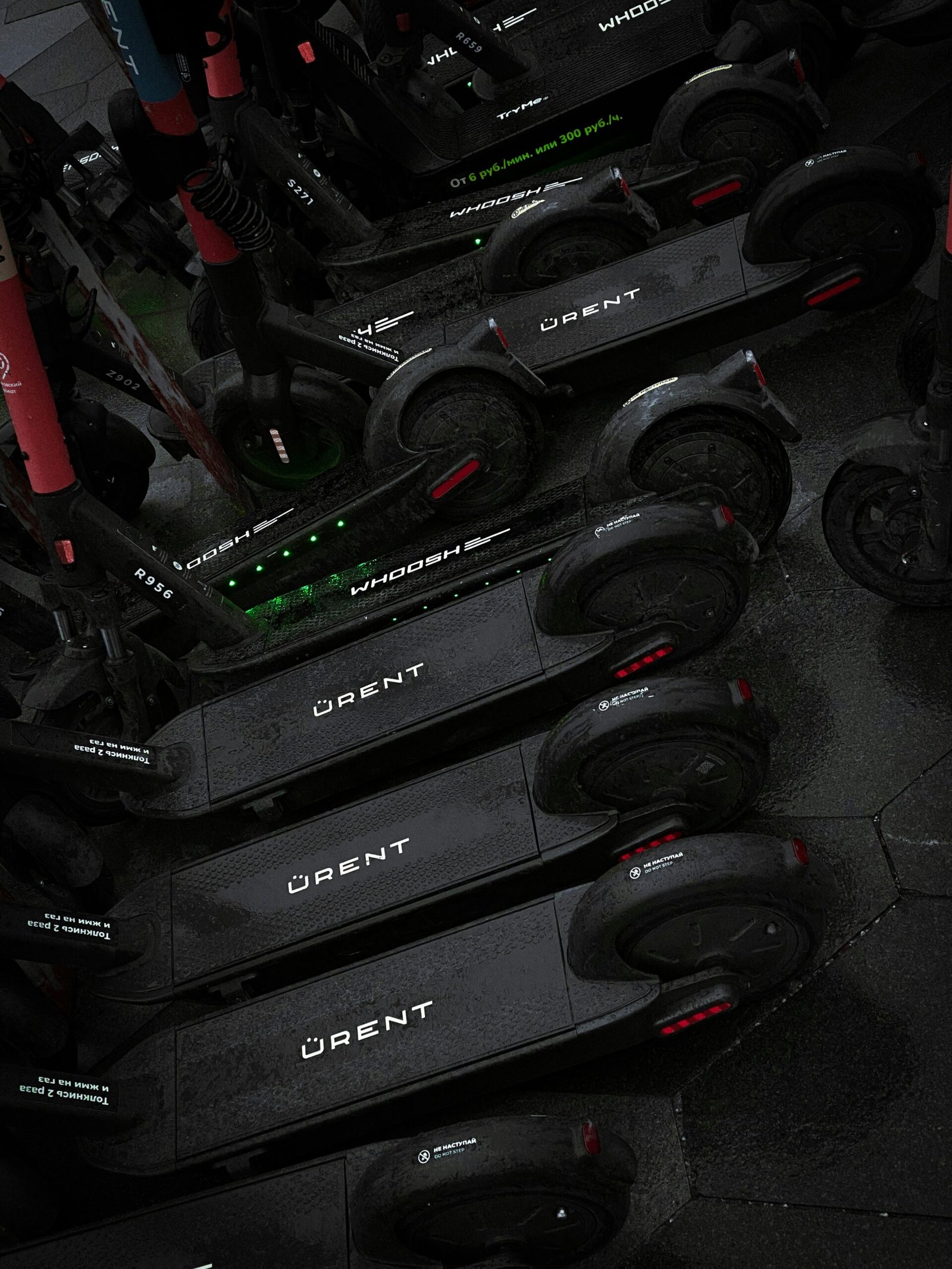
Donate or Sell Usable Parts
Online Marketplaces
Online marketplaces such as eBay, Craigslist, or Facebook Marketplace can be great platforms to sell or give away your usable electric scooter parts. Take clear photos, provide accurate descriptions, and set a fair price if you decide to sell. Alternatively, you can offer the parts for free if your aim is to promote reuse and sustainability. Remember to follow safety precautions when using these platforms and be mindful of potential scams.
Local Scooter Repair Shops
Local scooter repair shops often have a need for spare parts to repair or refurbish electric scooters. Contact them to inquire if they are interested in purchasing or accepting donations of usable parts. Building a relationship with a local repair shop not only helps you dispose of parts responsibly but also supports the repair economy and encourages a sustainable approach to maintenance and repairs.
Scooter Enthusiast Communities
Engaging with online or local scooter enthusiast communities can provide you with an opportunity to connect with individuals who may be interested in your usable parts. These communities often have forums, Facebook groups, or dedicated websites where members discuss repairs, modifications, and spare parts. Share your parts with them and offer a fair price or donation. Not only will this help you find a suitable home for your parts, but you may also learn more about electric scooters and connect with fellow enthusiasts.
Non-profit Organizations
Consider reaching out to non-profit organizations that focus on mobility or sustainable transportation. These organizations may have programs or initiatives that can make use of your usable electric scooter parts. They may provide mobility solutions to individuals in need, offer repair services, or promote environmental sustainability. Donating your parts to such organizations can have a meaningful impact on improving accessibility to electric mobility and fostering a better, greener future.
Recycle Non-Reusable Parts
Battery Recycling
Battery recycling is critical due to the hazardous materials they contain. Look for specialized battery recycling facilities in your area that accept electric scooter batteries. These facilities have the necessary tools and expertise to handle and recycle batteries safely. Many communities also offer specialized collection events or drop-off locations for batteries to ensure they are disposed of properly.
Plastic Recycling
Plastic components of electric scooters, such as casings and covers, are often recyclable. Separate the plastic parts from other materials and check with your local recycling center if they accept these plastics. Ensure that the plastics are clean and free of any non-recyclable materials, such as metal or rubber, before recycling them.
Metal Recycling
Metal parts, including aluminum or steel frames, can be recycled to reduce the demand for raw materials and conserve energy. Separate metal parts from other non-recyclable materials and check with local scrap yards or recycling centers if they accept these metals. Some facilities may require you to prepare the metals by removing any non-metal components before recycling.
Electronic Waste Recycling
Electronic waste, such as circuit boards, wires, and connectors, should be recycled to recover valuable materials and prevent environmental pollution. Find electronic waste recycling facilities in your area or inquire with local recycling centers if they accept these materials. Proper recycling ensures that potentially hazardous substances in electronics are safely handled and reclaimed for reuse.
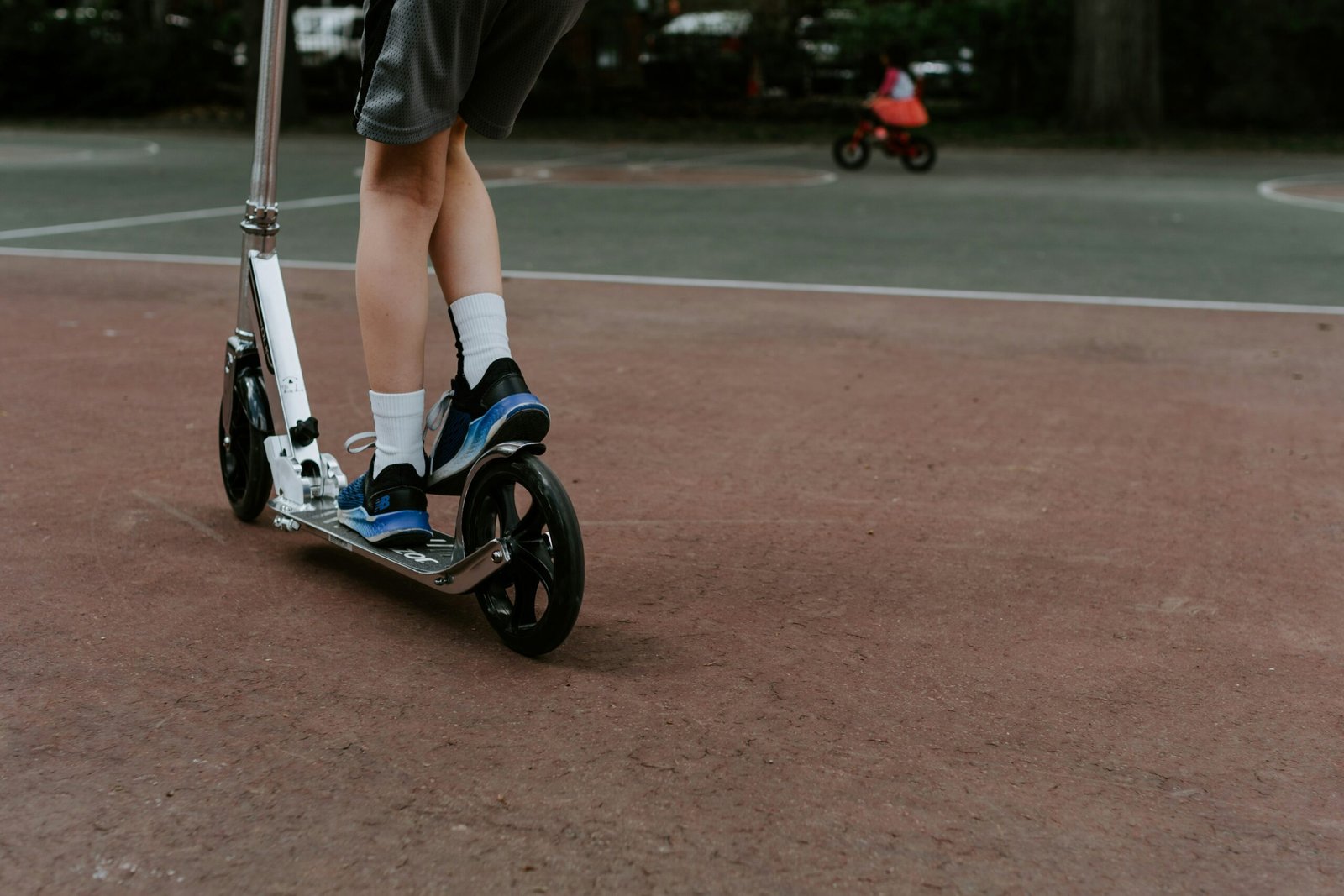
Contact Local Recycling Centers or Scrap Yards
Research Local Facilities
Research local recycling centers or scrap yards that accept electric scooter parts. Check their websites, contact them directly, or consult online directories to find out if they specialize in handling these types of materials. Ensure that the facilities you select have a track record of responsible recycling practices and comply with all environmental regulations.
Follow Disposal Guidelines
Once you have identified the appropriate recycling centers or scrap yards, familiarize yourself with their specific disposal guidelines. Some facilities may require you to separate different materials, remove certain components, or prepare the parts in a specific manner. Follow these guidelines closely to ensure that your parts are accepted and recycled correctly.
Arrange Pick-up or Drop-off
Contact the chosen recycling centers or scrap yards to arrange for the pick-up or drop-off of your electric scooter parts. Some facilities may offer pick-up services for larger or bulkier items, while others may require you to transport the parts yourself. Be prepared to provide information about the types and quantities of parts you have for disposal.
Dispose of Hazardous Waste Properly
Battery Disposal
Battery disposal should always adhere to proper protocols to avoid environmental contamination and hazards. If you cannot find a battery recycling program or facility, check with your local hazardous waste management agency for guidance on how to dispose of the batteries safely. They will provide information about collection events or drop-off locations specific to batteries.
Chemicals and Fluids
Electric scooters may contain chemicals and fluids that can be harmful to the environment or human health if not handled properly. These can include brake fluid, lubricants, or cleaning agents. Check with your local hazardous waste management agency for guidance on how to dispose of these chemicals safely. They may have specific drop-off locations or instructions for handling these substances.
Electronic Waste
Electronic waste from your electric scooter, including non-recyclable electronic components or damaged parts, should be disposed of as hazardous waste. Do not throw them in the regular trash. Contact your local hazardous waste management agency or electronic waste recycling facilities to find the appropriate channels for disposing of these materials. They will guide you through the proper disposal methods and ensure that any potentially hazardous components are handled safely.
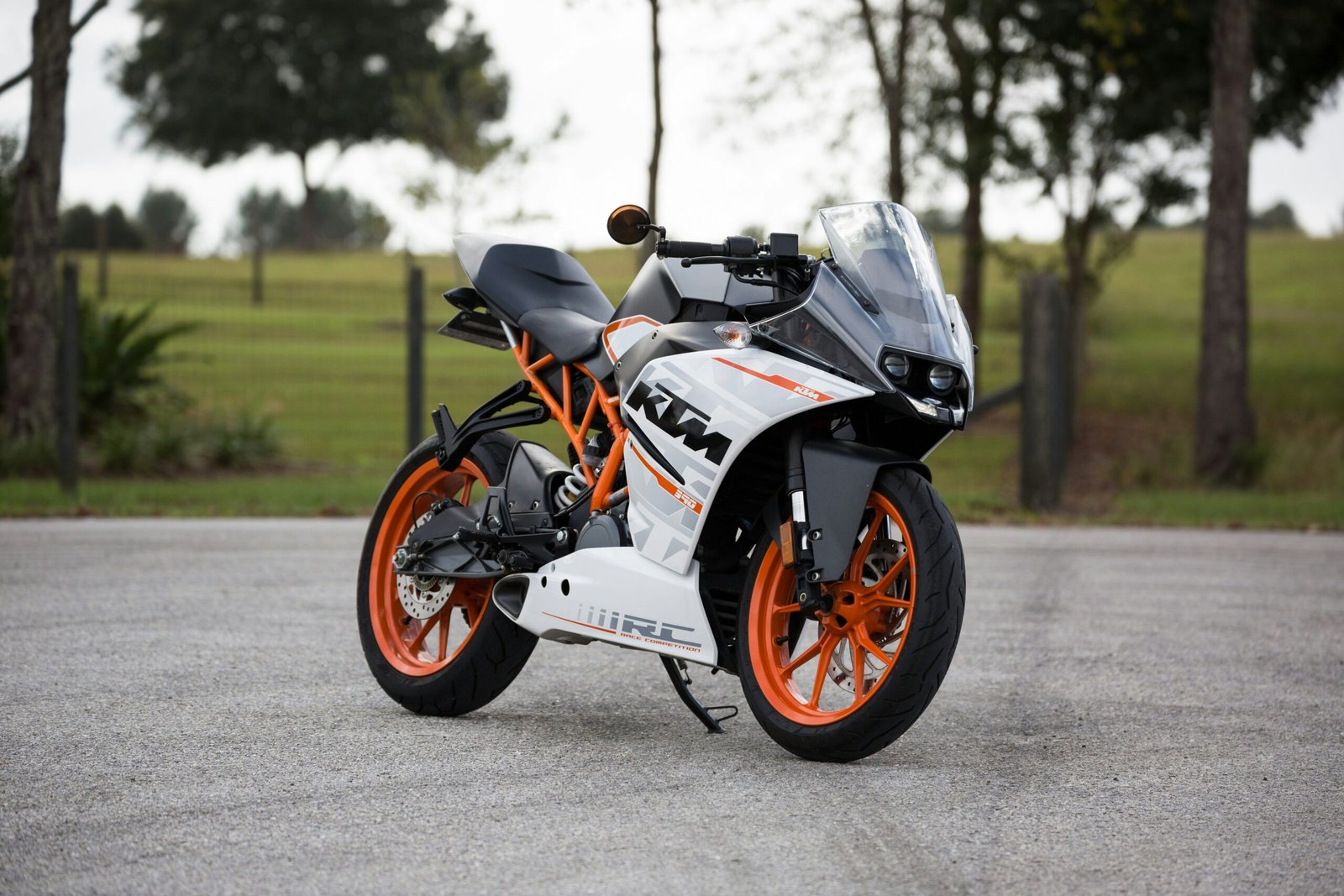
Consider Manufacturer Take-Back Programs
Check Manufacturer Policies
Some electric scooter manufacturers have take-back programs or initiatives in place. These programs allow you to return your old or damaged parts to the manufacturer for proper disposal or recycling. Check the manufacturer’s website or contact their customer support to inquire about their policies and any assistance they offer with the disposal of their products.
Return Programs or Initiatives
In addition to the manufacturer’s own take-back programs, some regions or organizations may have broader initiatives that promote the return of electric scooter parts. These programs aim to minimize waste and maximize recycling by ensuring that suitable disposal options are available. Check with local recycling centers, waste management agencies, or environmental organizations to see if they are part of such initiatives.
Utilize Municipal Waste Programs
Check Local Waste Management Guidelines
To dispose of any remaining non-recyclable parts or packaging materials, refer to your local waste management guidelines. These guidelines outline the specific practices and regulations for waste disposal in your area. Make sure to separate different materials and follow any sorting instructions to ensure proper disposal.
Separate Different Materials
When utilizing municipal waste programs, it is essential to separate different materials to facilitate recycling and proper disposal. Set aside non-recyclable parts, packaging materials, and any other waste from your electric scooter. Follow the guidelines provided by your local waste management agency to ensure that each material is disposed of correctly.
Follow Collection Schedules
Most municipalities have scheduled collection days for different types of waste, such as regular trash, recyclables, or hazardous materials. Familiarize yourself with these collection schedules to ensure that you know when and where to dispose of your electric scooter parts. By following these schedules, you can contribute to efficient waste management and avoid improper disposal.
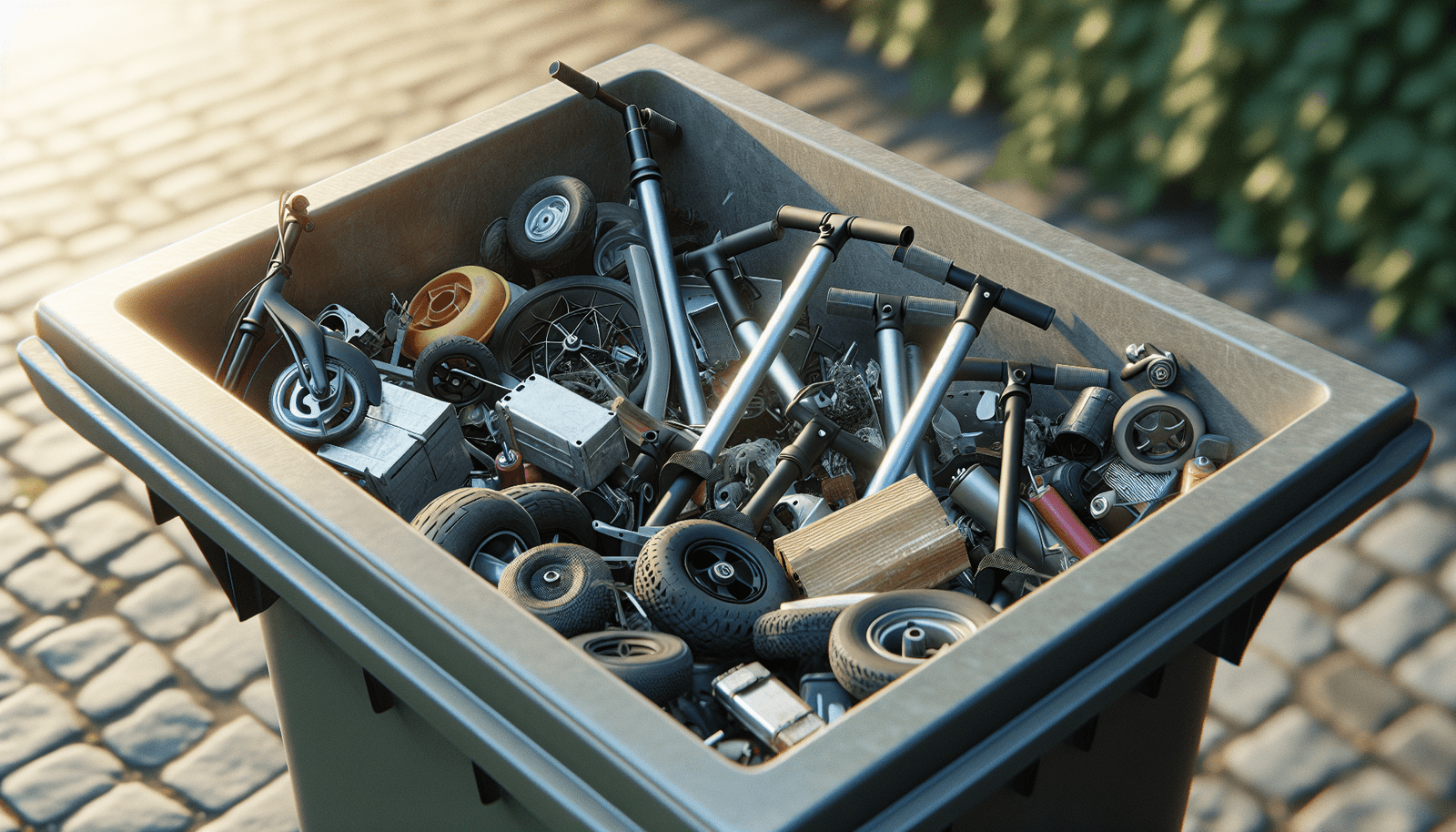
Educate Yourself About E-Waste Regulations
Research Relevant Laws
To ensure you comply with relevant e-waste regulations, research the laws and regulations specific to your region. Different countries or jurisdictions may have varying rules regarding the disposal and recycling of electric scooter parts. Familiarize yourself with these regulations to understand your responsibilities and obligations as a scooter owner.
Comply with Disposal Requirements
Once you have a good understanding of the e-waste regulations in your area, make sure to comply with the specific disposal requirements. Follow the guidelines provided by your local waste management agency or recycling facilities to ensure that you adhere to all applicable regulations. By doing so, you contribute to environmental protection and responsible waste management practices.
Avoid Illegal Dumping
Illegal dumping of electric scooter parts or any other waste is detrimental to the environment and can result in fines or legal consequences. It is important to dispose of your scooter parts properly and responsibly to avoid contributing to illegal dumping practices. Make use of the available recycling options, waste management services, and educational resources in your community to ensure that you are disposing of your parts legally.
Spread Awareness and Encourage Responsible Disposal
Inform Others about Proper Disposal
One of the most effective ways to promote responsible disposal is to inform others about the proper methods. Share your knowledge and experiences with friends, family, and colleagues. Explain why it is essential to dispose of electric scooter parts correctly and highlight the environmental and health risks of improper disposal. By raising awareness, you can inspire others to make informed choices and take responsible actions.
Promote Recycling and Reuse
Encourage the recycling and reuse of electric scooter parts by actively promoting these practices in your community. Share information about local recycling centers, scrap yards, or online platforms where people can buy or sell used parts. Support initiatives or events that focus on recycling and reuse, and engage with organizations working towards sustainable waste management. By promoting these practices, you contribute to the circular economy and sustainable resource usage.
Advocate for Sustainable Practices
Become an advocate for sustainable practices in the electric scooter industry. Engage with local authorities, manufacturers, and organizations to promote and support initiatives that focus on responsible disposal, recycling, and the reduction of e-waste. Participate in community events or workshops to share your knowledge and experiences. By advocating for sustainable practices, you contribute to positive change and help create a more environmentally conscious society.
As a responsible electric scooter owner, understanding the risks of improper disposal is crucial. By identifying reusable or recyclable parts, donating or selling usable parts, recycling non-reusable parts, and utilizing local recycling centers, you can ensure that your scooter parts are disposed of responsibly. It is also important to dispose of hazardous waste properly, consider manufacturer take-back programs, utilize municipal waste programs, educate yourself about e-waste regulations, and spread awareness to encourage responsible disposal. By following these guidelines, you contribute to environmental protection, minimize health hazards, and promote sustainable practices in the electric scooter industry.
